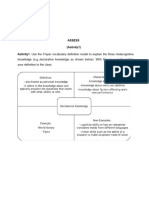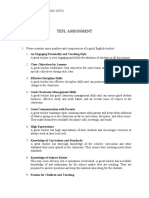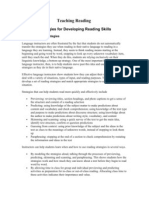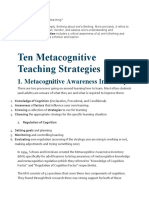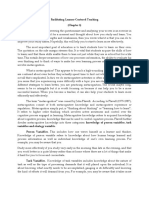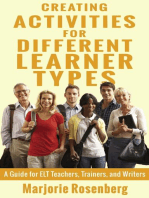0 ratings0% found this document useful (0 votes)
8 viewsQuestionnaire
Questionnaire
Uploaded by
xio liThe document discusses strategies employed by grade 2 teachers to develop reading comprehension skills in learners. It focuses on specific strategies like prior knowledge/previewing, predicting, inferencing, questioning, and visualizing. For each strategy, it examines the teacher's knowledge of and challenges with implementing that strategy, including differentiating instruction, addressing misconceptions, collaborating with other teachers, and creating suitable exercises. The goal is to understand how well teachers are able to teach these fundamental reading comprehension skills to their students.
Copyright:
© All Rights Reserved
Available Formats
Download as DOCX, PDF, TXT or read online from Scribd
Questionnaire
Questionnaire
Uploaded by
xio li0 ratings0% found this document useful (0 votes)
8 views5 pagesThe document discusses strategies employed by grade 2 teachers to develop reading comprehension skills in learners. It focuses on specific strategies like prior knowledge/previewing, predicting, inferencing, questioning, and visualizing. For each strategy, it examines the teacher's knowledge of and challenges with implementing that strategy, including differentiating instruction, addressing misconceptions, collaborating with other teachers, and creating suitable exercises. The goal is to understand how well teachers are able to teach these fundamental reading comprehension skills to their students.
Original Description:
Questionnaire
Original Title
questionnaire
Copyright
© © All Rights Reserved
Available Formats
DOCX, PDF, TXT or read online from Scribd
Share this document
Did you find this document useful?
Is this content inappropriate?
The document discusses strategies employed by grade 2 teachers to develop reading comprehension skills in learners. It focuses on specific strategies like prior knowledge/previewing, predicting, inferencing, questioning, and visualizing. For each strategy, it examines the teacher's knowledge of and challenges with implementing that strategy, including differentiating instruction, addressing misconceptions, collaborating with other teachers, and creating suitable exercises. The goal is to understand how well teachers are able to teach these fundamental reading comprehension skills to their students.
Copyright:
© All Rights Reserved
Available Formats
Download as DOCX, PDF, TXT or read online from Scribd
Download as docx, pdf, or txt
0 ratings0% found this document useful (0 votes)
8 views5 pagesQuestionnaire
Questionnaire
Uploaded by
xio liThe document discusses strategies employed by grade 2 teachers to develop reading comprehension skills in learners. It focuses on specific strategies like prior knowledge/previewing, predicting, inferencing, questioning, and visualizing. For each strategy, it examines the teacher's knowledge of and challenges with implementing that strategy, including differentiating instruction, addressing misconceptions, collaborating with other teachers, and creating suitable exercises. The goal is to understand how well teachers are able to teach these fundamental reading comprehension skills to their students.
Copyright:
© All Rights Reserved
Available Formats
Download as DOCX, PDF, TXT or read online from Scribd
Download as docx, pdf, or txt
You are on page 1of 5
Strategies Employed by Grade 2 Teachers in the Development of
Reading Comprehension Skills of Learners
Name (Optional): ________________________________
Age: ________
Sex: ________
Highest Educational Attainment: _____________________________
Civil Status: ____________
Length of Service: _____________
Instructions: Please read each statement carefully and check (/) the
appropriate frequency level that best matches the challenges you
encountered.
Legend:
(5) Always
(4) Often
(3) Seldom
(2) Rarely
(1) Never
Section 1: Knowledge of the participants about prior knowledge or previewing
In my class, when teaching my learners 5 4 3 2 1
about prior knowledge or previewing, I (always) (often) (seldom) (rarely) (never)
as a teacher:
1. Can identify learners who are having
a hard time with previewing.
2. Can address the misconceptions of
my learners towards previewing.
3. Can effectively differentiate
instructions to support learners with
varying levels of understanding of
previewing.
4. Can help in developing the
knowledge of my learners about
previewing.
5. Have sufficient knowledge about the
strategies and process on teaching
previewing.
6. Will collaborate with other teachers
on how to teach previewing.
7. I use a variety of strategies and
individual instruction in dealing with
previewing.
8. I assist my learners in improving their
reading comprehension skills by
creating suitable exercises that
strengthen and foster their ability to
preview.
Section 2: Knowledge of the participants about predicting.
In my class, when teaching my 5 4 3 2 1
learners about predicting, I as a (always
)
(often) (seldom
)
(rarely) (never)
teacher:
1. Knows how to properly
disseminate the instructions
towards teaching predicting as a
strategy in reading
comprehension to learners.
2. Have enough skills on teaching
predicting as a strategy in reading
comprehension.
3. Have no difficulties regarding the
basic principle of reading
comprehension which is
predicting that could lead to
effective instruction to my grade 1
learners.
4. Is able to select appropriate
activities on teaching predicting
as a part of reading
comprehension skills.
5. Have positive attitudes towards
teaching reading comprehension
strategies that can positively
impact my ability to teach.
6. Is familiar with different types of
activities that can help students
make accurate predictions.
7. Able to know how to differentiate
instruction for learners with
different learning needs when it
comes to teaching the strategy
predicting.
8. Have a wide awareness of the
role of predicting as a strategy
and how to help students reflect
on their prediction-making
processes and adjust the
strategies as needed.
Section 3: Knowledge of the participants about inferencing
In my class, when teaching my 5 4 3 2 1
learners about (always) (often) (seldom) (rarely) (never)
inferencing, I as a teacher:
1. Know that inferencing is any clue that
the passage would give for the
learner to have deeper
understanding.
2. Know the process on how to use
inferencing as a strategy on
developing reading comprehension
skills.
3. Know how to impart the true essence
of inferencing.
4. Know how to identify useful phrases
and clue that can be used to infer
ideas.
5. Know how to organize related ideas
together, combine it with some existing
background knowledge to make a new
connection.
6. Discuss inferencing effectively as a
strategy on developing reading
comprehension skills.
7. Able to effectively teach and reinforce
inferencing to my learners, using
evidence-based practices and
individualized instruction to ensure
their understanding and mastery of
this fundamental reading
comprehension skill.
8. Able to facilitate the development of
the summarizing strategy among my
learners by providing a variety of
engaging appropriate activities.
Section 4: Knowledge of the participants about questioning
In my class, when teaching my 5 4 3 2 1
learners about (always) (often) (seldom) (rarely) (never)
summarizing, I as a
teacher:
1. Know that questioning is an important
strategy in developing reading
comprehension skills of the learners.
2. Know the process on how to teach
questioning as a strategy on
developing reading comprehension
skills.
3. Know how to impart the true essence
of questioning.
4. Know how to motivate learners to
engage in class that will lead them to
develop questioning.
5. Can help learners to focus their
attention on key concepts and ideas
that will make them formulate
questions.
6. Discuss effectively questioning as a
strategy on developing reading
comprehension skills.
7. Able to effectively teach and reinforce
questioning to my learners, using
evidence-based practices and
individualized instruction to ensure
their understanding and mastery of
this fundamental reading
comprehension skill.
8. Able to facilitate the development of
the questioning strategy among my
learners by providing a variety of
engaging appropriate activities.
Section 5: Knowledge of the participants about visualizing
In my class, when teaching my 5 4 3 2 1
learners about visualizing, I as a (always) (often) (seldom) (rarely) (never)
teacher:
1. Can identify learners who are having
a hard time with visualizing.
2. Can address the misconceptions of
my learners towards visualizing.
3. Can effectively differentiate
instructions to support learners with
varying levels of understanding of
visualizing.
4. Can help in developing the
knowledge of my learners about
visualization.
5. Have sufficient knowledge about the
strategies and process on teaching
visualization.
6. Will collaborate with other teachers
on how to model visualization.
7. I use a variety of strategies and
individual instruction in dealing with
visualization.
8. I assist my learners in improving their
reading comprehension skills by
creating suitable exercises that
strengthen their ability to visualize
and comprehend the text.
You might also like
- Tefl CourseDocument52 pagesTefl CourseRenatoNo ratings yet
- Introduction To Psychology 10th Edition Plotnik Test Bank DownloadDocument31 pagesIntroduction To Psychology 10th Edition Plotnik Test Bank DownloadAgnes Severance100% (17)
- Strategies PowerpointDocument22 pagesStrategies Powerpointmaanyag6685100% (3)
- Educ 311 ChewoDocument7 pagesEduc 311 ChewocprabulanNo ratings yet
- Siop Strategies LessonDocument35 pagesSiop Strategies Lessonapi-570988433No ratings yet
- MetacognitionDocument3 pagesMetacognitionHsu Sandi AungNo ratings yet
- Read Aloud 2Document5 pagesRead Aloud 2api-278024645No ratings yet
- Module - Unit 1 - Facilitating - Learner - Centered TeachingDocument6 pagesModule - Unit 1 - Facilitating - Learner - Centered TeachingImee EusebioNo ratings yet
- TEACHING PROCESS - PART 2. Selection-Use-of-Instructional-MaterialsDocument54 pagesTEACHING PROCESS - PART 2. Selection-Use-of-Instructional-MaterialsspamseelogNo ratings yet
- UNIT 2 - Identifying Learners Training RequirementsDocument3 pagesUNIT 2 - Identifying Learners Training Requirementsjidhelm.eduNo ratings yet
- Cabales - Facilitating Learning Prelim - Midterm ModuleDocument19 pagesCabales - Facilitating Learning Prelim - Midterm ModuleApril Love C LambacoNo ratings yet
- 06-Metacognitive Model of Strategic LearningDocument39 pages06-Metacognitive Model of Strategic LearningAndres Hunter GrandonNo ratings yet
- Establish Training Needs Requirements.Document4 pagesEstablish Training Needs Requirements.bcabagNo ratings yet
- What Is Metacognition?: The Two Processes of MetacognitionDocument3 pagesWhat Is Metacognition?: The Two Processes of MetacognitionEster BersabalNo ratings yet
- Unit 4 - ModuleDocument18 pagesUnit 4 - ModuleAvyanna XyrelleNo ratings yet
- Ten Metacognitive Teaching StrategiesDocument16 pagesTen Metacognitive Teaching StrategiesFelicen JunaNo ratings yet
- Learning ProcessDocument44 pagesLearning Processrobert niño ponceNo ratings yet
- Overview of Explicit Teaching of Reading Comprehension SkillsDocument5 pagesOverview of Explicit Teaching of Reading Comprehension SkillsJason JulladoNo ratings yet
- 4 Instructional MethodsDocument23 pages4 Instructional MethodsNhial AbednegoNo ratings yet
- Week 13 14 Microteaching 1 - 075710Document5 pagesWeek 13 14 Microteaching 1 - 075710Dello GubatanNo ratings yet
- Portfolio Assignment Educ 5281 Unit 3Document4 pagesPortfolio Assignment Educ 5281 Unit 3مساحة أفكارNo ratings yet
- Siop Strategies LessonDocument35 pagesSiop Strategies Lessonapi-565608738No ratings yet
- Sop QuestionnaireDocument6 pagesSop QuestionnaireHilleyNo ratings yet
- Toaz - Info FL Module 1pdf PR 2Document13 pagesToaz - Info FL Module 1pdf PR 2Kyle Andre IbonesNo ratings yet
- Tefl AssignmentDocument5 pagesTefl AssignmentLeeLowersNo ratings yet
- HRG Module 1Document21 pagesHRG Module 1marivic mirandaNo ratings yet
- Teaching ReadingDocument2 pagesTeaching ReadingWahyu Qiply RosesNo ratings yet
- Educ 2 Module 2 NotesDocument5 pagesEduc 2 Module 2 Notesarevalodal.psaueskwela.edu.phNo ratings yet
- Learner Characteristics: Learning StylesDocument5 pagesLearner Characteristics: Learning StylesmostarjelicaNo ratings yet
- 14.ten Metacognitive Teaching StrategiesDocument23 pages14.ten Metacognitive Teaching StrategiesStephen100% (2)
- Skripsi - Bab 3, 4 Klaudius ArvanDocument25 pagesSkripsi - Bab 3, 4 Klaudius ArvanSamuelNo ratings yet
- P.ed 5 Part 1 M 1Document31 pagesP.ed 5 Part 1 M 1Jene Rose DeniegaNo ratings yet
- Act-Six Instructional StrategiesDocument3 pagesAct-Six Instructional Strategiesapi-297639709No ratings yet
- FACILITATING LEARNING Module 1Document5 pagesFACILITATING LEARNING Module 1Jayson Palma100% (3)
- ELECED Multiple Intelligences and Differentiated InstructionDocument45 pagesELECED Multiple Intelligences and Differentiated InstructionRj BetuinNo ratings yet
- FIELD STUDY 4: Exploring The CurriculumDocument3 pagesFIELD STUDY 4: Exploring The CurriculumNordelyn JacelaNo ratings yet
- Class Agenda Presentation in Brown and Green Illustrative StyleDocument30 pagesClass Agenda Presentation in Brown and Green Illustrative StyleleahnmaelNo ratings yet
- Teaching Strategies in English - The Case of Batangas State University Malvar, PhilippinesDocument6 pagesTeaching Strategies in English - The Case of Batangas State University Malvar, PhilippinesJuvy MojaresNo ratings yet
- Teaching Strategies Impact On LearningDocument36 pagesTeaching Strategies Impact On Learningkulet_mamaNo ratings yet
- Approach & MethodologyDocument12 pagesApproach & MethodologySarderMoinUdDinNo ratings yet
- 695 Holley Strategy Demonstration 1-ReflectionDocument5 pages695 Holley Strategy Demonstration 1-Reflectionapi-241126891No ratings yet
- Module 1 Metacognition and Learner-Centered Psychological PrinciplesDocument54 pagesModule 1 Metacognition and Learner-Centered Psychological PrinciplesBrixylle AnneNo ratings yet
- CGT CPD GeographyandLiteracyAdditionalnotesDocument3 pagesCGT CPD GeographyandLiteracyAdditionalnotesGeniva N. FortichNo ratings yet
- Metropolitan ADocument119 pagesMetropolitan ABrenda PeñNo ratings yet
- Chapter 1 MCCDocument6 pagesChapter 1 MCCDREXTER DANCILNo ratings yet
- Seven Strategies To Teach Students Text ComprehensionDocument3 pagesSeven Strategies To Teach Students Text ComprehensionDMaliezNo ratings yet
- Final Semester Test Subject: TeflDocument4 pagesFinal Semester Test Subject: TeflNurhayati ManaluNo ratings yet
- Remedial ReadingDocument31 pagesRemedial ReadingJason JulladoNo ratings yet
- Research QuestionnaireDocument6 pagesResearch QuestionnaireMaricel D. CagaNo ratings yet
- Facilitating Learner-Centered TeachingDocument30 pagesFacilitating Learner-Centered TeachingJanzen A. GabioNo ratings yet
- Facilitating Learner Centered TeachingDocument14 pagesFacilitating Learner Centered Teachingsadsadako111No ratings yet
- Cuestionario 2 - Learning Styles and StrategiesDocument5 pagesCuestionario 2 - Learning Styles and StrategiesSpec47100% (1)
- MIDTERM-LEARNING-MODULE - FACILITATING LEARNING FDocument5 pagesMIDTERM-LEARNING-MODULE - FACILITATING LEARNING FLouie FranciscoNo ratings yet
- Module 1 MetacognitionDocument20 pagesModule 1 MetacognitionMa. Rochelle CabralesNo ratings yet
- CH 8 - SelectedDocument9 pagesCH 8 - SelectedAli QuasimNo ratings yet
- Bpiapacruz@math 31 Act 7Document29 pagesBpiapacruz@math 31 Act 7Billy CruzNo ratings yet
- Learning Activity SG 2Document28 pagesLearning Activity SG 2Name S. CruzNo ratings yet
- 20 - 8 -كتاب استراتيجيات نهائي 2024Document78 pages20 - 8 -كتاب استراتيجيات نهائي 2024btsfgtyhi675No ratings yet
- Field Study 2: E-PortfolioDocument65 pagesField Study 2: E-PortfolioJap PetpetNo ratings yet
- Creating Activities for Different Learner Types: A Guide for ELT Teachers, Trainers, and WritersFrom EverandCreating Activities for Different Learner Types: A Guide for ELT Teachers, Trainers, and WritersRating: 5 out of 5 stars5/5 (1)
- Learning How to Learn: ‘A Guide to Effective Teaching and Learning Strategies’From EverandLearning How to Learn: ‘A Guide to Effective Teaching and Learning Strategies’Rating: 4.5 out of 5 stars4.5/5 (3)
- The Powers of The Mind Perdev ReportDocument2 pagesThe Powers of The Mind Perdev ReportUelNo ratings yet
- ETIReport G7Document5 pagesETIReport G7darshanawale02No ratings yet
- Asia Sultan Assignment SRTDocument11 pagesAsia Sultan Assignment SRTasia sultanNo ratings yet
- Raciocinio Clinico - Explorando Suas Caracteristicsa e Ampliando Seu AprenizadoDocument9 pagesRaciocinio Clinico - Explorando Suas Caracteristicsa e Ampliando Seu AprenizadoFrederico PóvoaNo ratings yet
- Peer TutoringDocument3 pagesPeer TutoringNikka YbañezNo ratings yet
- Alarcon Espinoza Et Al 2023 Focusing On The Task and Emotional Self Regulation Daily Challenges in The ClassroomDocument29 pagesAlarcon Espinoza Et Al 2023 Focusing On The Task and Emotional Self Regulation Daily Challenges in The Classroomfernandomartin2001No ratings yet
- 268 Book Manuscript 2049 1 10 20201207Document28 pages268 Book Manuscript 2049 1 10 20201207John ErnieNo ratings yet
- Artificial Intelligence and Machine LearningDocument10 pagesArtificial Intelligence and Machine Learningpbkpradhan06No ratings yet
- SOLMS Mark 1997 What Is ConscieounsnessDocument14 pagesSOLMS Mark 1997 What Is ConscieounsnessBougleux Bomjardim Da Silva CarmoNo ratings yet
- The Empathy MapDocument2 pagesThe Empathy MapPankaj VasudevaNo ratings yet
- Neurobiology of MemoryDocument19 pagesNeurobiology of MemoryJEGANSESHANNo ratings yet
- Development of Silent Reading Fuency and ReadingDocument28 pagesDevelopment of Silent Reading Fuency and Readingasma sariNo ratings yet
- Rubrics For CHI2112Document3 pagesRubrics For CHI2112Ka Po ChanNo ratings yet
- Qualitative Research On Vocabulary and Spelling Skills of A Student Chapters I IIIDocument23 pagesQualitative Research On Vocabulary and Spelling Skills of A Student Chapters I IIIarniza blazoNo ratings yet
- 2835-Article Text-5565-1-10-20210413-2Document4 pages2835-Article Text-5565-1-10-20210413-2Lalu Yoga Dwi PutraNo ratings yet
- Computers Versus Humans: Milan E. SoklicDocument4 pagesComputers Versus Humans: Milan E. SoklicHani malik KhanNo ratings yet
- The Power of Not Thinking Roberts en 47464Document6 pagesThe Power of Not Thinking Roberts en 47464jai JeeNo ratings yet
- Lightbown 02Document18 pagesLightbown 02Michelle AlonteNo ratings yet
- Nur 105Document5 pagesNur 105pioneergloria51No ratings yet
- Brain Based LearningDocument12 pagesBrain Based LearningkdkijejekNo ratings yet
- Theories of Papez and Duffy-1Document9 pagesTheories of Papez and Duffy-1Dolly GuptaNo ratings yet
- Sullivan Dissertation 2016Document193 pagesSullivan Dissertation 2016Hamada ElzaiatNo ratings yet
- Lesson 1 Fundamentals of ThinkingDocument40 pagesLesson 1 Fundamentals of ThinkingCEDRICK NICOLAS CUGAS VALERANo ratings yet
- Uni2 NNDLDocument21 pagesUni2 NNDLSONY P J 2248440No ratings yet
- MCQ Chp1 ETItubaDocument7 pagesMCQ Chp1 ETItubajtuba6815No ratings yet
- MCS-224 Artificial Intelligence and Machine LearningDocument493 pagesMCS-224 Artificial Intelligence and Machine Learningvikram139singhNo ratings yet
- TMS3729 Assignment 02Document4 pagesTMS3729 Assignment 02na.dlakavuNo ratings yet
- MCQs On Solo TaxonomyDocument10 pagesMCQs On Solo TaxonomyHina KaynatNo ratings yet
- Stress Management Through Garden DesignDocument5 pagesStress Management Through Garden DesignaldaNo ratings yet



